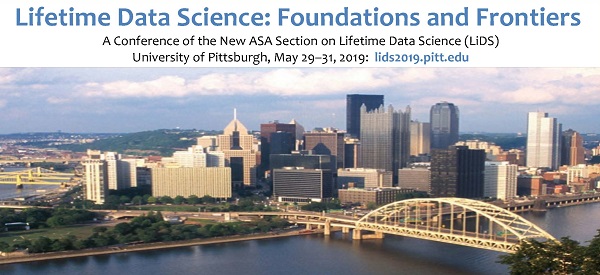
To celebrate the creation of the ASA Section on Lifetime Data Science, LiDS is organizing a conference, “Lifetime Data Science: Foundations and Frontiers,” to be held at the University of Pittsburgh from May 29–31, 2019. The conference will begin with short courses taught by leading experts on May 29, including the following:
- Two-Phase Studies for Lifetime Data,
Ornulf Borgan and Sven Ove Samuelsen (University of Oslo, Norway)
- Dynamic Prediction in Survival Analysis,
Hein Putter (Leiden University Medical Centre, The Netherlands)
- Biased Sampling, Left Truncation, and Survival Analysis,
Jing Qin (NIH/NIAID)
Invited speaker sessions are planned on topics including survival analysis, joint modeling, competing risks and multistate models, recurrent event analysis, prediction, causal inference in life history analyses, measurement error, and missing data. There will also be three keynote addresses given by internationally renowned statisticians:
- Odd Aalen of the University of Oslo,
- Danyu Lin of the University of North Carolina at Chapel Hill, and
- Ross Prentice of the Fred Hutchinson Cancer Research Center
Additionally, a poster competition and student paper competition is being organized by Guoqing Diao of George Mason University. Information about how to apply is available at the Lifetime Data Science Conference site. Science program committee members include Richard Cook of the University of Waterloo and Jianwen Cai of the University of North Carolina; the local organ committee members include Ying Ding of Pitt Biostatistics and Yu Cheng, Pitt's statistics department. For more information, visit the Lifetime Data Science Conference website,
lids2019.pitt.edu
___________________________________
About the ASA Section on Lifetime Data Science (LiDS)
The American Statistical Association's Section on Lifetime Data Science (LiDS) aims to promote and support the development, application, and appropriate use of statistical methods for the design and analysis of studies of life history processes. This includes supporting the development of new methods, identifying new areas of application, and fostering interdisciplinary research in areas such as biomedicine, finance, economics, imaging, engineering, genomics, and genetics.
1/18/2019